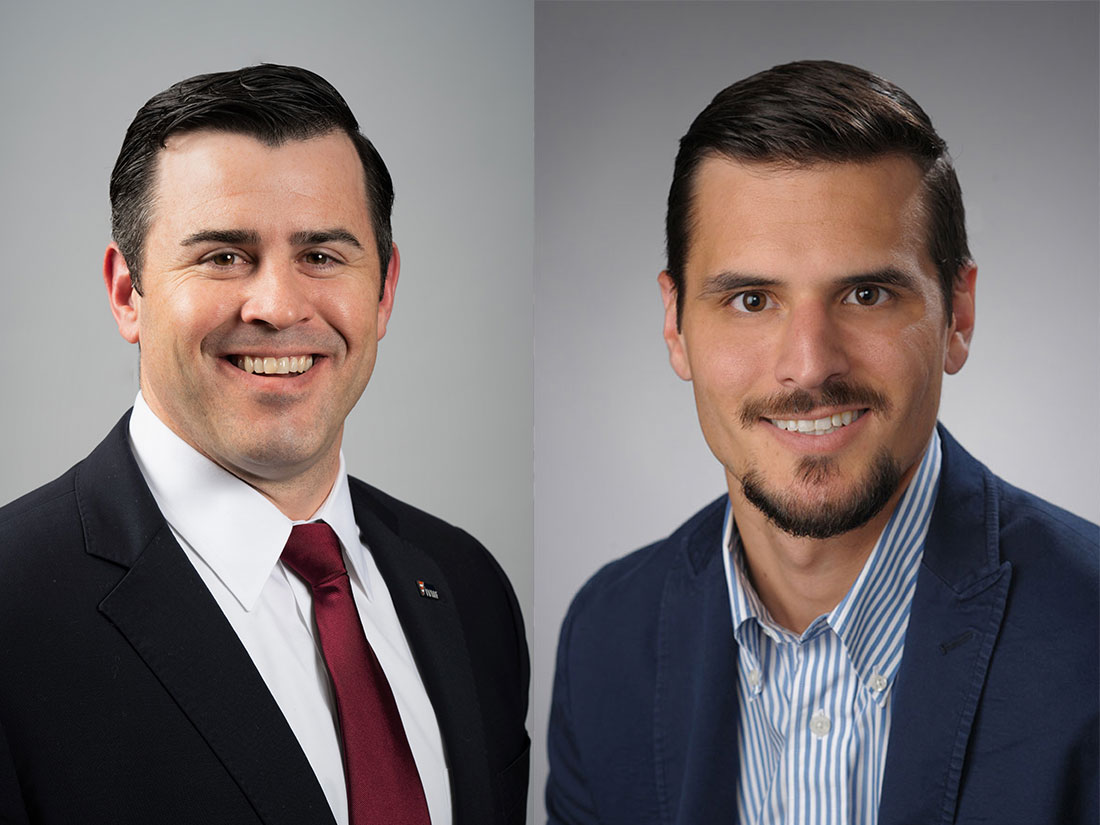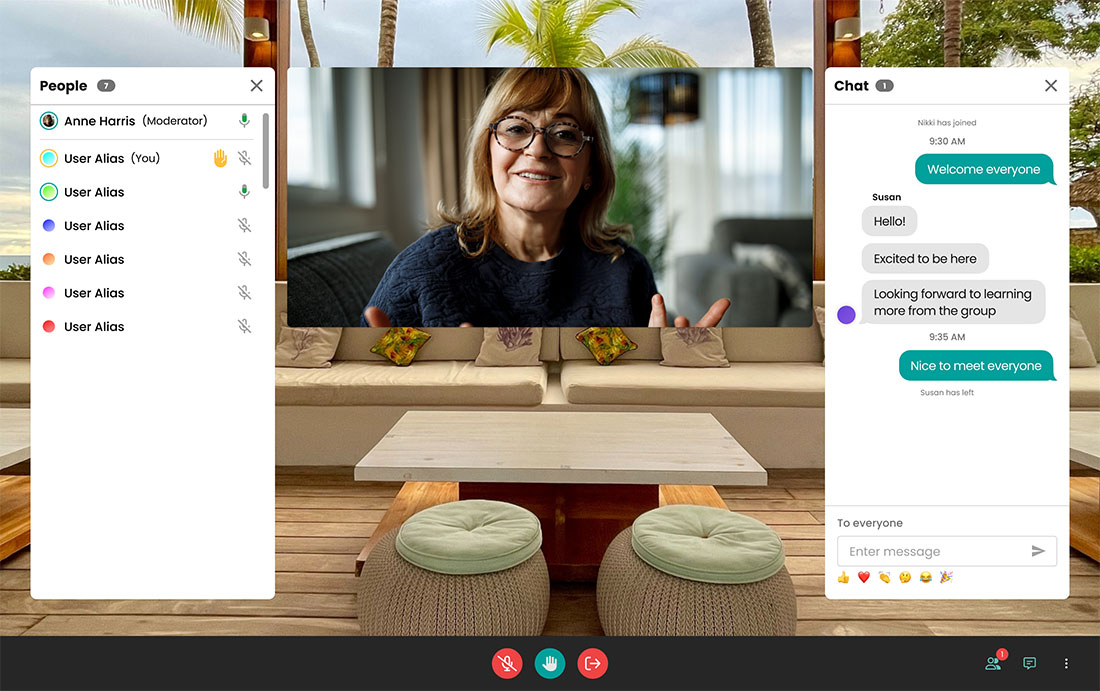
Ken Marfilius and Nick Armstrong are U.S. military veterans who have dedicated their lives to helping active military members, veterans, and their families.
Together, they have created a new and innovative partnership starting this spring that will greatly benefit veterans as well as students from the School of Social Work at Syracuse University’s Falk College of Sport and Human Dynamics.
Marfilius, a U.S. Air Force veteran and assistant dean of online education and associate teaching professor in the School of Social Work, and Amstrong, a U.S. Army veteran and head of public sector at Cabana, teamed with Cabana Co-Founder and CEO David Black to form a partnership that will integrate their immersive group support technology into the School of Social Work’s curriculum and tap into the combined strengths and capabilities of both organizations.
“Our collaboration with Ken and Falk leverages our immersive support technology platform, Cabana, and combines it with Syracuse University’s academic excellence and its nationally recognized commitment to veterans,” Armstrong says. “Our plan includes hands-on initiatives such as internships, collaborative education, and joint research. These efforts will bring our partnership to fruition and strengthen our shared commitment to serving military communities.”
As Syracuse University’s first Post 9/11 GI Bill recipient, Armstrong earned his M.P.A. and Ph.D. from the Maxwell School of Citizenship and Public Affairs. He spent nine years at Syracuse’s D’Aniello Institute for Veterans and Military Affairs before joining Cabana, which builds innovative technology solutions that provide guided mental health support for employers, healthcare workers, and military professionals.
Marfilius, who received his bachelor’s degree in psychology from Syracuse and his M.S.W. and D.S.W. degrees from the University of Pennsylvania, developed the first military mental health course at Falk College, serves as Falk’s student veteran liaison, and led the creation of the partnership between Falk and Syracuse University’s College of Law that helps help veterans access the legal services they need.
So, when Armstrong reached out to Marfilius to discuss ways in which they could partner around the services Cabana provides to military populations, Marfilius jumped right in and started working with Armstrong and Black on the framework for their collaboration.
“I believe the partnership between Cabana and Falk College is innovative in social work education and mental wellness,” Marfilius says. “It offers the ability to integrate real-world internships and cutting-edge tele-mental health training into our curriculum. We can prepare our graduate students for the future of social work, ensuring they are not only skilled but also technologically adept.” Marfilius and Armstrong discuss this partnership on Cabana’s “You’re Always fine” podcast in an episode called “Building bridges in mental health.”

Here are the highlights of this unique partnership:
Cabana Internship.
Cabana will host one graduate student intern from the School of Social Work to support ongoing peer group support operations and psychoeducational content development. The intern will work under the supervision of Cabana’s head of mental wellness for a minimum of 500 hours.
Tele-Mental Health Training and Education Support.
Cabana will collaborate with Falk College faculty to embed its immersive group support technology into ongoing coursework and curricula to foster training and preparation of future social work professionals.
“The tele-behavioral health landscape is evolving rapidly, demanding practitioner and client adaptability to virtual environments,” Armstrong says. “Our partnership infuses Falk’s curriculum with leading-edge tools via Cabana’s underlying technology platform, better preparing students for client engagements through digital platforms.
“Moreover, Falk students, equipped with an advanced tier of military cultural competence, will enhance our clients’ experiences–and their future clients–with more relatable, informed support that builds trust and overcomes stigma,” Armstrong adds.
Military and Veteran Virtual Peer Groups.
Cabana will work with Falk faculty and its alumni network to assist ongoing virtual peer support groups for military and veterans starting this spring.
“This collaboration aligns with the Syracuse University mission to be the best place for vets, and it uniquely positions us to offer specialized support to our military and veteran communities,” Marfilius says. “Through virtual peer support groups and the development of tailored psychoeducational content, we are providing them with the essential mental health support they deserve.”
Military and Veteran Psychoeducational Content Development.
Cabana will work with Falk College faculty to review and evaluate Cabana content as a third-party reviewer.
“Engaging with industry partners allows us to bring practical, real-world experiences into our academic environment,” Marfilius says. “This partnership brings vast possibilities for research collaborations and advancement in peer interventions and group psychoeducation.”
CEU/Education Credits.
Falk College faculty will provide feedback, evaluate, and where appropriate, certify Cabana groups and content to satisfy New York State CEU (continuing education unit) requirements for wellbeing hours.
Research Collaborations.
As opportunities arise for Cabana and Falk College, the two entities agree to evaluate research collaborations and grant opportunities surrounding peer interventions, group psychoeducation, and other forms of mental health support.
“This collaboration aims to address the critical national shortage of mental health professionals, leveraging technology to extend reach and overcome barriers to access, especially for underserved populations,” Armstrong says. “It’s not just about serving more; it’s about serving smarter and cultivating a workforce ready for the challenges of today’s and tomorrow’s mental health landscape.”
Social Work students interested in getting involved in this partnership should email Marfilius at kjmarfil@syr.edu, or School of Social Work Director of Field Education Tracy Walker at ttwalker@syr.edu. Graduate students interested in the internship will go through an interview process with the School of Social Work and Cabana, and the intern will receive a modest stipend.
